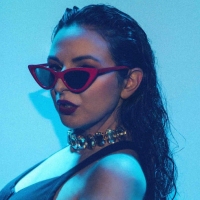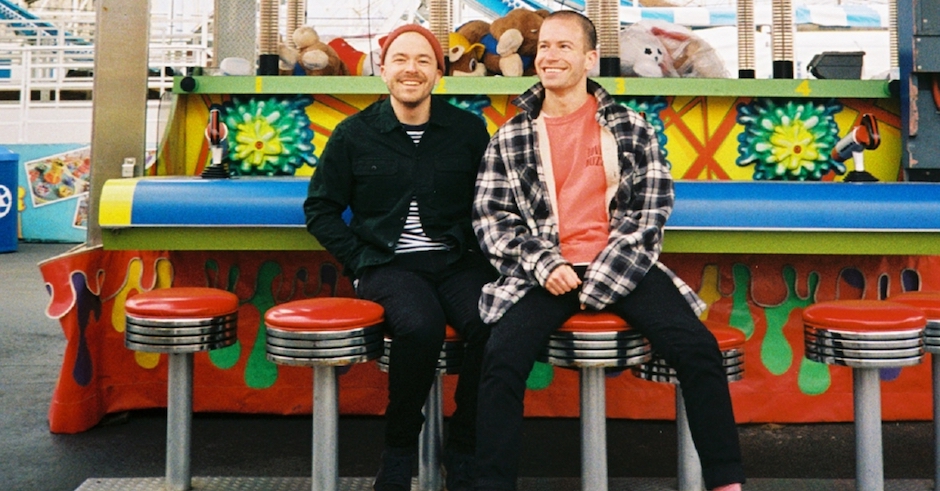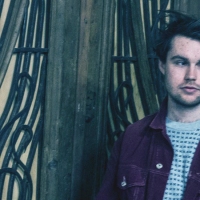 Introducing Melbourne party-starter MIMI and her debut single, Bad Girls KnowAfter flexing her skills as one of the country's most versatile DJs, the Melbourne musician launches her solo project with an irresistible tune.
Introducing Melbourne party-starter MIMI and her debut single, Bad Girls KnowAfter flexing her skills as one of the country's most versatile DJs, the Melbourne musician launches her solo project with an irresistible tune.

Interview: Gilligan Moss talk their new EP, Jamie XX, sampling and more
The New York-based duo are one of house music's most exciting rising acts, something their second EP - What Happened? - aims to cement.
"What we’re doing with the project is to look to the capital C – cool club music – realm but also to what’s happening on the radio, what’s happening in pop," explains Evan Dorfman, one-half of New York-based house duo Gilligan Moss. "It's about finding ways to bring worlds together and make music that can exist in the club, and at home, while still being informed by pop songcraft. Fusing those things together is what our ultimate goal is on this EP." Said EP, the recently-released What Happened? (out now via AMF Records / Caroline Australia), does this perfectly, mixing the worlds of house and funk among bright vocals from both guest collaborators and samples alike, with dazzling synth lines and playful melodies further adding to the bright and refreshing five-track release. Take the EP's irresistible Want U So Bad for an example, with the eclectic duo - composed of Evan and long-time friend Ben Cronin, both from Chicago - combining a driving, funk-like bassline with one of house music's catchiest vocal hooks, the end result being something playable both at home and in the club.
Originally formed as the solo project of Evan, Gilligan Moss have always pushed the boundaries of house music. Their debut EP, 2015's Ceremonial, placed the then-solo outfit as an 'act to watch' amongst club circles, and remixes for Sia, Tegan & Sara and Glass Animals pushed Evan further into the spotlight - the latter of which encouraging the Australian festival favourites to welcome Gilligan Moss as a support act a full-length tour. When the work-load became too much, in came Ben - a childhood friend of Evan - who in the few years since, has added a signature touch to the pairing's sound, allowing them to further diversify and do what they came to do on their first release as a duo - bridge the cliff-faces of house music and pop music.
Citing influences in everyone from Jamie XX and Four Tet to Daft Punk, Outkast and Animal Collective, Gilligan Moss' genre-bounding sound is on display across What Happened?'s diverse five tracks, with guest collaborators BETSY and Ross - plus a few uncredited names - adding refreshing vocal twists above Gilligan Moss' versatile collection of productions, which twist this classic, UK house sound with shadings of funk and disco. It really welcomes a new era to the duo, and with the EP out now - stream it below - we caught up with both Evan and Ben to talk about it, their influence in Jamie XX and his approach to house music, plus a whole heap more.
So this is your first release since the debut Ceremonial EP back in 2015, and if I'd have to guess, I'd say the most significant change for Gilligan Moss in the three year break is Ben joining the team – you guys have been friends forever, so how did the idea of forming a duo come about?
Ben: Evan and I grew up in Chicago quite close to each other, and when Evan started putting music out, I really liked it – even if I didn’t realise it was him. Through some weird Facebook snooping I realised it was him, so I reached out and just told him that I really like his music. He sent me a couple of tracks he had been working on and right at the first EP, in the middle of it being written, he got asked to do a remix of Glass Animals. He absolutely knocked it out of the park, so they asked him to go on tour with ‘em. At the time I was working for a start-up company led by Dan Deacon, the electronic musician, which I was fired from for being sucky at sales which I will completely admit to – I’m a terrible salesman.
So anyway, I got fired from that and Evan was going on tour, so he asked me to be his tour manager and yeah – it sorta went from there. I helped him set-up, and then I helped him rehearse, and then I helped out on a couple of tracks here and there where I’d chime in every once in a while, and I guess at some point Evan decided it would be better to have two people on stage than one.
He was like “hey, we should so do this.” I remember at the time I was trying to find a new job and I wasn’t really inspired by anything, so I was like “yeah, I guess”, and here we are now.
How do you think the inclusion of bringing in a second member, being Ben, change the dynamic of the Gilligan Moss project?
Evan: It certainly has kept me a lot saner. It’s a lot more fun doing it with someone else and not having to sit in a room alone and drive yourself crazy. So I think from even just a sanity point it made a big difference.
Creatively too. It’s great to have a second person to bounce ideas off. When we decided to become a duo, it wasn’t like I was writing all the stuff and Ben was just chiming in. We pretty quickly got to a point where we’re equally starting ideas and finishing each other’s ideas. It kind of doubled the creativity levels – having two creative minds on the same thing.
In regards to the music alone, Ben comes from a more classical background whereas I don’t, so everything changes and his impacts everything – all the way down to where the chords are formed.
So if you listen to What Happened? and compared it to what you were putting out before came in, the changing dynamic is still really obvious?
Evan: Yeah, I think the title track – What Happened? – is the perfect example of that. It’s similar to an older song of mine, Choreograph. I kind of think of that song as a much less polished version of What Happened? It’s definitely a result of Ben and also the result of a few more years of writing and getting better over the years.
Ben: I think also the influences switched things up a bit. Like, I basically have no understanding of electronic music whatsoever and when I joined Evan was relatively deep in that hole. I think sort-of cross-pollinating our inspirations, I think that is really more evident on this record compared to the previous one.
Also, something I really admired about Evan is that because he didn’t have that classical background he wasn’t as bound to conventional songwriting if that makes sense. I think this EP demonstrates a bit more... intentional... songwriting kind of thing.
That makes sense with what you guys were saying about the whole theme of the EP, how you wanted to bridge that gap between club music, pop music, traditional music, radio music and so on. How do you even approach bridging this gap as producers?
Evan: It’s super hard. On paper, that sounds pretty terrible. Like, I don’t know, I find that crossover club-pop pretty horrible.
Ben: We were just talking about this the other day. We’re struggling to think of a lot of artists that do link those realms. One of our all-time heroes is Jamie XX, and I think he does that perfectly – he takes a lot of ideas from underground club music but packages it in a way that you can listen to it at home, or in a way that your friends would enjoy even if they’re not into electronic music. It’s super hard to do. I think we’ve written a bunch of sad songs trying to do that, some that made the EP, some that we’re hoping will make the album. We’re really showing an evolution of us trying to find this connection.
Evan: Yeah, I also think a lot of electronic musicians get pigeonholed into a specific genre or scene. Then conversely, in the pop scene, I think people focus too much on writing the most polished sounding pop. I think we’re trying to bridge this gap, but also avoid being trapped in each of those.
You mention Jamie XX as a big influence and I like the way he approached bridging this gap on In Colour. You have some very obvious club-centric or club-influenced tracks and then you have tracks like Loud Places with Romy, which is definitely more pop-like, and I think that’s sorta due to the addition of the vocals. Your upcoming EP is very vocal-based, do you think that helps give it a bit of a radio-friendly twist?
Ben: Yeah, definitely. Vocals can do so much more than any electronic melody or something nine times out of ten.
Evan: When we show each other music we like or share music for DJ sets, a lot of it is club-orientated stuff. But I think that the end of the day, our all-time favourite songs are songs with vocals – like really well-constructed pop songs or something – that’s sorta the holy grail.
On the EP, you experiment with vocals quite a bit in different ways. If I stuff this up please correct me, but on the EP, you have Movements and Heartbeats which feature credited vocalists in Betsy and Ross. Then, is Want U So Bad and Fever uncredited vocalists or sample-based, and What Happened – the title track – sample-based?
Evan: Close - Fever is a sample. What Happened? and Want U So Bad are uncredited vocalists.
You mention your influences in Jamie XX and Four Tet, and a lot of them are really sample heavy – whether it’s through vocals or more production-wise. What is your relationship with sampling?
Evan: I’d say we have a very strong relationship with sampling. It certainly drives our publishers up the wall, but it’s hard to even think of our creative process without sampling. Most things we do start from a sample. I don’t know if we really do anything without a sample in it.
Ben: At least to start with anyway. We’d start with one, and then it’ll kinda inform us to take things where they go, and then they get pulled out. It’s usually always the bedrock of how we start stuff.
Evan: I think it adds a bit of texture too for a lot of electronic music. It really helps us make music that isn’t cold and heartless.
I ask because I feel like in pop music and even hip-hop, there’s always this sense of hysteria about sampling. Like, you see news sites go nuts because a song used the same sample as another, or there’s the same chord progression sorta thing. Do you have to take this into consideration when sampling? Like, who’s used what before and how did they use it?
Evan: Yeah, a little bit. Another artist we really love is Four Tet, and I remember my mind being blown that he has full albums made 100% of samples all collaged together. We try to do some of that – a lot of our music doesn’t even feel like a sample, like it’ll be a snare hit or a sound that has been pitched up so much that it’s undetectable. I think it a lot of ways it doesn’t even matter because it’s so manipulated. But when it comes to the bigger, more perceptible samples, I think it can go both ways. A played-out sample we’d probably avoid, but at the same time, it’s interesting to do your own take on a classic sample.
Just to switch things up before we stop, you guys are from Chicago, correct?
Evan: Yeah.
I ask because I find when it comes to house music, it’s always so focused on the UK and Europe. I know house music was literally invented in Chicago – or so they say – but what’s it like there now?
Evan: I last lived there probably four years ago, and at least at that time, classic Chicago house was kind-of relegated to the sideline which is a shame. There’s been a huge wave of Chicago hip-hop that kind of dominate the scene there and then you have you’re y’know, constantly touring electronic act kinda thing. It seemed like the classic Chicago DNA... you have to kind of look for it. It’s not prevalent.
Ben: We’re probably more informed than electronic music in the UK than Chicago, to be honest. I’ll be the first person to admit that when it comes to Chicago music, I definitely listen to a lot more Chance The Rapper and Knox Fortune than anything. More hip-hop leaning stuff. I think there’s like an energy and songwriting you get in Chicago now which is really cool – like by your Chance The Rapper's – and we’re more informed by that energy than the house scene there I think.
Gilligan Moss's new EP, What Happened?, is out now via AMF Records/Caroline Australia. Follow Gilligan Moss on Facebook HERE.
 Introducing Melbourne party-starter MIMI and her debut single, Bad Girls KnowAfter flexing her skills as one of the country's most versatile DJs, the Melbourne musician launches her solo project with an irresistible tune.
Introducing Melbourne party-starter MIMI and her debut single, Bad Girls KnowAfter flexing her skills as one of the country's most versatile DJs, the Melbourne musician launches her solo project with an irresistible tune.
 Premiere: Camikaze returns from a year-long hiatus with haunting new single/video, RushThe Perth producer is still one of this state's most intriguing young producers.
Premiere: Camikaze returns from a year-long hiatus with haunting new single/video, RushThe Perth producer is still one of this state's most intriguing young producers.